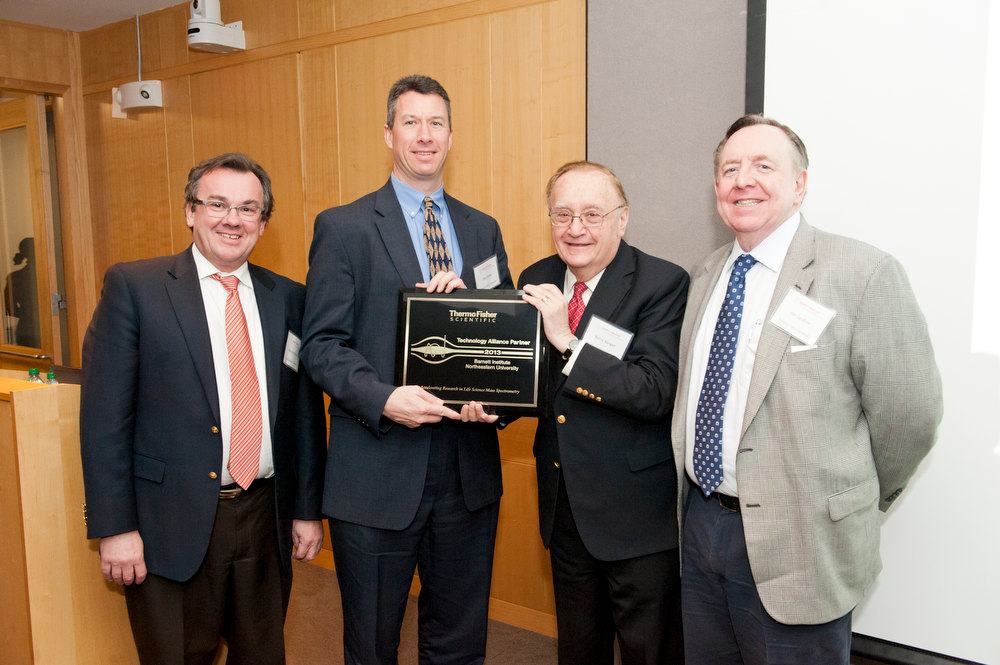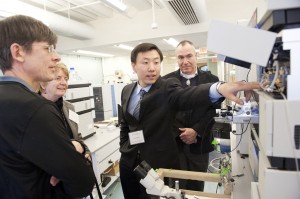
Murray Gibson, founding dean of the College of Science, Dan Shine, President of the Chromatography and Mass Spectrometry Division at Thermo Fisher Scientific, Barry Karger, Director of the Barnett Institute of Chemical and Biological Analysis and the James L. Waters Chair in Analytical Chemistry, and Ian Jardine, vice president of Global R&D at Thermo Fisher Scientific at the technology alliance partnership dedication. Photo by Brooks Canaday.
by Angela Herring for news@Northeastern
Earlier this week, Northeastern University’s Barnett Institute of Chemical and Biological Analysis formally announced a technology alliance partnership with Thermo Fisher Scientific, a multibillion-dollar analytical instrumentation and product company, based in San Jose, Calif., with corporate offices in Waltham, MA.
Researchers noted that mass-spectrometry — an analytical technique that determines molecular masses of compounds in a sample — is on the verge of a revolution. The new instrumentation being developed at organizations like Thermo Fisher will change the face of life-sciences research, they said. With this alliance, Northeastern scientists will play a critical role in the direction of this emerging field.
The developments reflect a broader shift in the general nature of research collaboration, said Barry Karger, director of the institute, which is internationally recognized as a premier center for research and advanced training in analytical chemistry for biomedical applications.
The current and future trend, said Karger, resembles a triangle between government researchers, universities, and industry. “We think this is critical, because nobody has all the answers,” he continued, noting that academia must work with the medical community to identify problems that need solving and with industry to build advanced technologies.
The alliance will focus on three research areas, including complex protein characterization, developing methods for analyzing trace amounts of biomarkers in proteomic samples, and developing new methods for analyzing biosimilar drugs.
Researchers from the Barnett Institute and Thermo Fisher, as well as members of the local biotechnology and academic communities, gathered for the announcement, a discussion of the partnership’s expected impact, and a tour of the Barnett laboratory, where state-of-the-art instrumentation is available to advance life-science research.

Daniel Dai, second from right, a Principal Research Scientist at the Barnett Institute, gives a tour of the facility. Photo by Brooks Canaday.
“I’d like to say a word of thanks not only for this dedication but for many years of collaboration with our friends,” said Karger. “It certainly has made a great difference in the research in my laboratory and others in the Barnett Institute.”
During the event, Karger and Thermo Fisher vice president and chief technology officer Ian Jardine presented highlights of their institutions’ respective research activities over the last several years, as well as expectations for future investigations. “We’re only at the beginning of this journey in the application of mass spectrometry to life sciences,” said Jardine.
The partnership follows on the heels of a long-standing relationship between the two institutions: In 1998, in honor of the Barnett Institute’s 25th anniversary, Northeastern alumnus and Thermo’s then-vice president John Hatsopolous endowed a young scholars program aimed at establishing the careers of up-and-coming analytical chemists.
“Building on relationships with instrument and biotech companies is a way not only to provide opportunities for coop and training, but also to bring to us the state-of-the-art technology that allows us to do the most exciting science,” said Murray Gibson, dean of the College of Science, which is home to the Barnett Institute. The Thermo Fisher alliance, he said, is a wonderful example of such a relationship.
The company’s mission to “make the world healthier, cleaner and safer” is deeply aligned with that of Northeastern, where research is use-inspired and focused on solving global challenges in health, security, and sustainability.
“This is a tremendous partnership, and we’re honored to be working closely with a leading institute like Northeastern,” said Dan Shine, president of the chromatography and mass-spectrometry division at Thermo Fisher, which also has partnerships with New York University, Princeton University, and the University of Wisconsin.
“These relationships are really important to helping us understand the requirements of leading academics and helping us improve the instrumentation we make, improve our software, and improve our applications knowledge,” Shine said. The Barnett Institute of Chemical and Biological Analysis has partnered with Thermo Fisher Scientific to enable life-science applications with sophisticated instrumentation.
